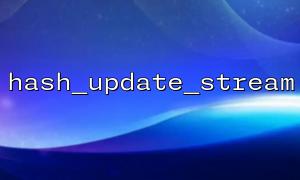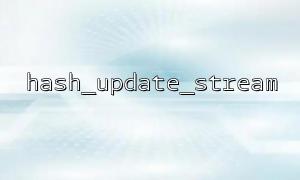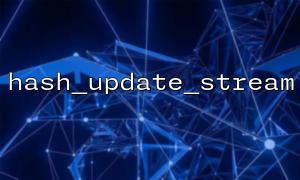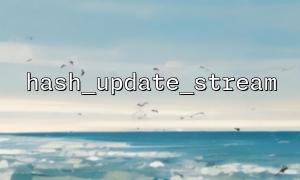In PHP, we often use the hash_update_stream function to update hash values, especially when processing large files or streaming data. However, when reading a file or stream, you may encounter some errors, such as the file does not exist, insufficient permissions, etc. At this time, we need to use try-catch to catch and handle these exceptions to avoid program crashes or unnecessary errors.
hash_update_stream is a hash update function in PHP that allows us to continuously update the hash value on streaming data. For example, it can be very useful in handling scenarios such as file uploads, network request flows, and more. To ensure that the program can handle it gracefully when encountering a read error, we need to wrap the relevant code in a try-catch block.
The hash_update_stream function is to input data from a stream (such as a file or other data stream) into a hash context to update the hash value. The basic usage is as follows:
bool hash_update_stream ( resource $context , resource $stream [, int $length = 1024 ] )
$context : hash context (created via hash_init ).
$stream : The resource stream to be read (for example, file handle).
$length : The number of bytes read per time, the default is 1024.
When actually using the hash_update_stream function, we usually need to provide a valid stream resource (such as a file handle). If the stream cannot be read or an error occurs, the hash_update_stream function fails and returns false . At this time, we can avoid program interruptions by catching exceptions and handling these errors.
Common resource reading errors include:
The file does not exist
Insufficient file permissions
Network request failed (if the stream comes from the network)
In PHP, the try-catch block is used to catch exceptions and process them. We can put the call of the hash_update_stream function in a try block, and when the read stream fails, the error is caught and handled appropriately. For example, we can record error messages, prompt the user to upload the file again, or take other countermeasures.
Here is a sample code for catching resource read errors when calling hash_update_stream function using try-catch :
<?php
// Set file path and hashing algorithm
$filePath = '/path/to/your/file.txt';
$hashAlgo = 'sha256';
// Create a hash context
$context = hash_init($hashAlgo);
try {
// Open the file
$file = fopen($filePath, 'rb');
if (!$file) {
throw new Exception("无法Open the file: $filePath");
}
// Update hash
while (!feof($file)) {
// use hash_update_stream Update hash值
if (!hash_update_stream($context, $file)) {
throw new Exception("Unable to read file stream: $filePath");
}
}
// Get the final hash value
$hashValue = hash_final($context);
echo "The hash value of the file is: $hashValue";
// Close the file
fclose($file);
} catch (Exception $e) {
// Capture errors and output
echo "mistake: " . $e->getMessage();
}
?>
In this example, the hash context is first initialized by the hash_init function.
Then, use fopen to open the file. If the file cannot be opened, an exception is thrown.
Next, in a while loop, use hash_update_stream to continuously read the file stream and update the hash. If the stream is read error, an exception is thrown.
Finally, get the hash value of the file and close the file.
The try-catch block ensures that the program can catch and handle errors when file read fails without crashing directly.
After catching the error, we can adopt different error handling strategies according to different needs. For example:
Prompt the user to upload the file again.
Log the errors to the log for subsequent viewing.
Returns a friendly error message to the front-end user.
Use try-catch to capture resource read errors in hash_update_stream function, which can effectively improve the robustness of the program. When processing files or streaming data, make sure that the program can handle various possible exceptions and avoid interruptions or errors. In this way, we can ensure that the program can handle appropriate errors when encountering problems, ensuring user experience and system stability.















